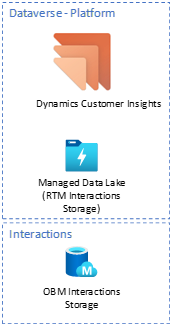Dynamics Customer Insights Journeys provides organizations with the ability to plan and execute customer experiences through which they can engage with their customers. Dynamics Customer Insights Journeys includes visualizations and dashboards to allow organizations to perform the analysis of this insights data. In addition to the out-of-the-box reporting, customers require the ability to create their own custom reports.
Overview of Dynamics Customer Insights Journeys
Within the Dynamics Customer Insights Journeys product there are two main modules which group the available functionality: outbound Marketing (OBM) and Real-Time Journeys (RTJ). Each carry their own features but, from a reporting perspective, they provide similar capabilities with in-app insights which cover the more common uses and analysis. In RTM this is provided through PBI Embedded reports as well as operational analytics for a selected channel asset (Access and interpret analytics - Dynamics 365 Customer Insights | Microsoft Learn) while OBM provides Insights controls in the Email, Journey and Contact forms (Analyze results to gain insights from your marketing activities - Dynamics 365 Customer Insights | Microsoft Learn).
Both keep track of the way marketed contacts react to marketing messages and provide detailed analytical views to help organisations understand the impact and analyse the ROI of executed campaigns. Each key table provides statistics, analytics, and key performance indicators (KPIs) based on the interaction results. These insight categories cover a wide range of activities like email interactions, web interactions, form interactions etc. The difference occurs is in how the interaction data is stored.
When outbound marketing was designed, it created an architecture which utilized Azure storage to hold the interaction data for the journeys. This provided faster response times than what was possible in Dataverse at that time. Dataverse has evolved and a managed data lake is now available within it, providing the faster storage that Dynamics Customer Insights Journeys needs. Real-Time Marketing makes use of this storage to take the place of the previously created Azure storage. The resulting architecture looks like this

Dynamics Customer Insights Journeys Custom Reporting
When customers using OBM wanted to create custom reports, the approach followed was to replicate the data to additional storage and then build the custom reports on this replica data store. This approach presented challenges to properly secure the exchange of data between the Dynamics data store (aka Dataverse) and a customer repository. In addition, it requires the development and maintenance of the code to move the data.
With the March release of Customer Insights Journeys, a new feature was introduced in Public Preview which allowed the surfacing of the interaction data to Microsoft Fabric. Extraction of data will therefore no longer be required for custom reports based on Dynamics Customer Insights Journeys data, thus ensuring that custom reporting can occur with the data remaining in the secure Dataverse boundaries.
Microsoft Fabric provides an end-to-end analytics and data platform that can ingest, transform and report on data. It provides the ability to join up multiple data services from multiple vendors into a single platform. For more information, refer to the documentation (What is Microsoft Fabric - Microsoft Fabric | Microsoft Learn)
In order to surface the data into Fabric, a customer would need to:
- Provision a capacity. This could be Premium Capacity, Fabric Capacity or Trial Capacity
- Link the Dataverse environment to the provisioned capacity
- Create a Fabric Workspace for Customer Insights Journey interactions
- Create shortcuts in the workspace for the required tables
No changes in reporting with “outbound marketing only” interactions
For customers that require custom reports that include “outbound marketing only” interactions they may continue using the export to Azure Blob Storage feature. This feature continues to be supported and can be safely used as needed. To be able to use this feature customers will need to provision an Azure Blob Storage and create a “Shared Access Signature” and use this URL to create a new analytics configuration record. After this is completed, Dynamics 365 Customer Insights Journeys will begin to export interaction data as individual files to your blob storage container, and you can start using this data for your custom reporting requirements.
Step by step instructions to use this feature can be found here.



